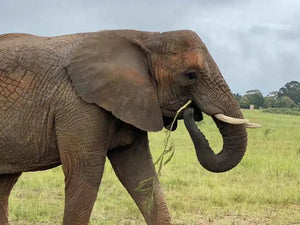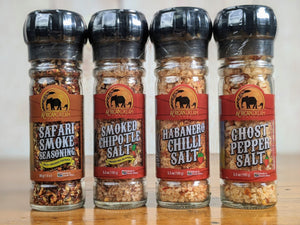Time’s Running Out to Save the African Elephant
Mar 05, 2021
They’re highly intelligent, deeply emotional and sadly in danger. Today, there are less than 500,000 remaining African elephants left in the wild. With population numbers in steep decline, experts have made the jarring prediction that these wild giants could fall into extinction within our lifetime. That is why it is more important than ever to save the African elephant.
Here are the primary factors impacting their struggle and—more importantly—how we can take action to keep them from disappearing forever.

Habitat Loss and Human Conflict
At between 8 and 13 feet tall and 5,000 to 14,000 pounds heavy, the African elephant is our planet’s largest land-dwelling animal. Sadly, when it comes to dietary needs the elephant’s massive size makes for a massive appetite. Over the last several decades, booming human populations have spurred the encroachment of civilization into natural areas, putting these beautiful giants at odds with their increasingly developed surroundings.
Although researchers have successfully implemented some less-invasive methods for driving groups of elephants away from populated areas (such as using recordings of the sound of angry honey bees or even using hot chillis like the African ghost pepper to deter them), not all methods are so kind. Many have resulted in the injuring or even killing herd members; this has made efforts to save the African elephant increasingly difficult.

Even after an elephant herd is successfully driven away, they face the declining availability of adequate land to live on. With deforestation and industrial development on the rise, today’s African elephants have fewer square miles of suitable habitat than ever before.
Ivory Trade and Poaching
African elephants need their tusks for attracting mates, foraging food and fighting off predators. But they’re also an in-demand luxury material used in ivory artwork, ornaments, jewellery and piano keys. At hundreds of dollars per pound, ivory sourced from African elephant tusks have become an in-demand status symbol, especially in countries like China.

Of course, if removing or dying an elephant’s tusk was all it took to deter poachers, the problem may have been solved already. Unfortunately, an elephant’s tusk is deeply embedded into its skull, leading poachers to brutally and violently kill the animals in order to remove the material. In just three years between 2010 and 2013, more than 100,000 African elephants were killed in the name of the ivory trade.
Since the early 1990s, international trade bans on ivory and initiatives like the African Elephant Database have made efforts to ease these tragic consequences and protect the continent’s wild elephant populations, but improvements have been minimal. Looking to the future, saving the African elephant will prove difficult—but not impossible.
Conservation Efforts—How You Can Help
During the 1500s there was an estimated 26 million elephants roaming Africa’s dense forests and grasslands.
Today, there is less than 500,000.
The scariest part? Elephants are what conservation scientists call a “keystone species,” meaning they play an integral role in the life and survival of other animals in their environments. While the African elephant’s extinction would be tragic in itself, the extended consequences of their absence would be catastrophic to the continent as a whole, disrupting the ecosystem with untold devastation.
If current trends continue, the African elephant will likely face extinction in the next 20 years. Thankfully, current trends don’t have to continue—we have the power to enact real change and keep these majestic land mammals from disappearing forever. We have the power to save the African elephant.

As a socially conscious food brand, African Dream Foods is committed to keeping wildlife conservation on the forefront of the consumer conscious. That’s why we’ve crafted an all-natural, irresistible line of hot sauce and spices that give flavor enthusiasts the opportunity to experience authentic African flavor while simultaneously supporting the cause. When you purchase any bottle of our hot sauces or spices, between .10 and .40 cents will be donated to Africa’s leading wildlife conservation organizations.
The most effective conservation initiatives happen from within Africa, through grassroots movements that focus on educating and empowering local community members to fight for the continent’s vulnerable wildlife. But they can’t do it alone.




